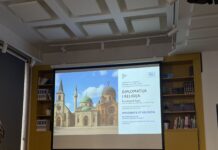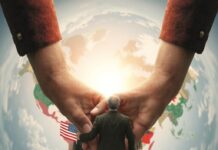Stefan Vukotić comes from Montenegro, where he currently works as a government PR-officer in charge of international public relations and twitter. He studied international relations in England, at the University of Cambridge and at the University of Montenegro.
Stefan, do you feel European?
I do, yes, very much.
How come?
Geographically and historically, Montenegro has always belonged to Europe. I don’t necessarily, I don’t all, to be honest, connect my identity as a European to the European Union. I don’t think it is necessary to be a member of the EU to say that you’re European. So basically, I find that Europe is a geographical area and shared historical and civilisational values that have effected each of the countries that are physically in Europe throughout history.
What are these European values to you?
If we go back in history, I would have to say Christianity, although nowadays if you’re not Christian, it doesn’t mean that you cannot be European and the other way around. You can be a Christian from Europe and not feel European. Does that make any sense? (laughs) Then there are the values traditionally associated with political liberalism: political freedoms, free speech, right to vote, to choose political representation whether it’s a republican forum or a monarchical. Obviously the associated freedoms of assembly and so on. Equality between the sexes, equality between ethnicities, certain property rights. All languages being connected, both historically speaking, and influencing each other. And multiple layers of identity – local, regional, national, ethnic, religious, and, of course, European.
What I have noted here in Germany is that Germans don’t feel as European as they should. Especially the less they have to do with it.
Yes, that’s very strange, I have come across that a lot, especially in the Western European countries. I don’t really understand why people feel such way. Maybe because, historically speaking, they were so focused on building their national identities. But I think if people would question themselves sufficiently and deep down, they would have to feel at least to some degree European.
How do you promote the EU in your job?
I have several tasks in that regard. I was recently involved in helping with drafting the EU communications strategy of the government. In my daily work I have defined that we should communicate several key priorities of the government which include economic development, tourist resorts and so on. And among these priorities is Montenegro’s EU integration. So we promote what the government does in the EU accession negotiations, we promote EU values and we promote generally how Montenegro fits in the great village of Europe.
70 per cent of the Montenegrins think Montenegro belongs in the European Union. That is quite a high number!
When you ask people whether they feel European I think the numbers would be even higher. But there is this misconception what being European means. People would say from the top of their heads they feel European, but would have some negative associations when you mention the EU in terms of rules and regulations. In the sense that they would view the EU as making us do reforms that we wouldn’t do if it weren’t for the EU. And they feel that there is this pressure from the EU. That’s also due to the way we communicated the process in the past. We were not explaining to the public properly, but we now aim to explain them why these changes are actually domestic reforms and something that should change regardless to whether we wish to join the EU or not. But in terms of European values, most of them are cherished by people in Montenegro, especially those political ones I mentioned earlier. There are still negative attitudes though towards certain things which are novel to us in Montenegro, such as same-sex marriage and pride parades.
So you use that image how?
Montenegrins like the EU, no, they actually love it. That’s why we used to “blame” the EU for the reforms, because the government knew that the people loved the EU so much that whenever they wanted to push something, they say it’s to do with European values and then the people would go for it. There has been a saturation with that to a degree now. But in addition to loving the EU, the citizens don’t really know that much about the EU itself. They know about the values, the common identity, the abilities to find employment elsewhere, to be a part of the common family of European nations and so forth, but they don’t know about the exact policies, the exact processes, they don’t know much about the institutions, how our sovereignty will change, and so on. So that’s worth noting that they have this idea of Europe and a united Europe in the European Union.
Do you think life has changed in Montenegro since the accession process started?
The negotiation process itself has to a degree affected the life in Montenegro. You hear Chapters 23 and 24 being mentioned everywhere. Ordinary people don’t know or care much for the technicalities, but there’s talk about EU integration. And we seem, I think, more attractive to foreign investors, because the EU integration process makes us appear safer for investment and part of a strong group of nations, and not just some hidden corner in the middle of the Balkans, which as a concept, has been unfairly negatively viewed in the West. But with the EU the Balkan “stigma” is less damaging. Because it’s being profiled internationally as a more European country, or close to the EU. So its international image has improved and I would say in that regard that has contributed to the improved quality of life.
That sounds quite positive.
Yes, but on the other hand we have had the economic crisis, which hit us hard and the prices soared. Basically, with the same amount of money you can buy much less now than you could four years ago. In that way life has also deteriorated. We have had several major companies that closed or went bankrupt, or are in the process thereof. So there has been both improvement and deterioration. But I would say given the overall picture that the EU accession process has contributed to a positive development in Montenegro.
Where do you see the EU in 20 years?
I would like to see the EU well and alive, with Montenegro in it, in the next 20 years, but hopefully much sooner. And I would like to see the EU more united than it is now. Not necessarily a European federation, although that could turn Europe into a large geo-strategic and geo-economic player. But I definitely see a future for the EU and I hope other Europeans do as well and I hope that the current euroscepticism and europhobia in the EU is just a by-product of the economic crisis, which will go away, once the EU nationals see that there more benefits of the EU membership than being outside of it.
Thank you, Stefan!
all photos ©laurasoria, cover photo private
http://www.hungry-for-europe.eu/interview-stefan-vukotic/


















